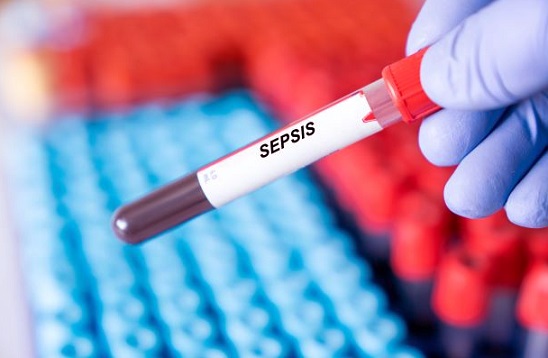Nikhil Prasad Fact checked by:Thailand Medical News Team Feb 25, 2025 1 month, 2 weeks, 6 days, 18 hours, 29 minutes ago
Medical News: Sepsis is a life-threatening condition that occurs when the body has an extreme response to an infection. In COVID-19 patients, sepsis remains a leading cause of complications and fatalities, often due to late diagnosis and limited treatment options. Researchers from the Global Medical Education and Research Foundation, Bharati Vidyapeeth Medical College, Gleneagles Hospitals, Hackensack Meridian School of Medicine, and Marshall B. Ketchum University conducted an in-depth study to explore how programmed cell death (PCD) markers can help distinguish between COVID-19 patients with and without sepsis.
 Programmed Cell Death Markers and Sepsis in COVID-19
Programmed Cell Death Markers and Sepsis in COVID-19
This
Medical News report delves into how specific molecular markers associated with programmed cell death can provide insights into disease progression and severity, potentially guiding better treatments for patients in critical care.
Understanding the Role of Programmed Cell Death in COVID-19 and Sepsis
Programmed cell death is a natural biological process that eliminates damaged or infected cells from the body. This process includes different mechanisms, such as apoptosis (a controlled form of cell death), pyroptosis (inflammatory cell death), necroptosis (regulated necrosis), and autophagy (cell self-digestion). The study investigated various markers of these processes, focusing on caspase-3 (apoptosis), caspase-1 (pyroptosis), MLKL (necroptosis), LC3B, and p62/SQSTM1 (autophagy).
COVID-19 is known to trigger severe immune responses, often leading to widespread inflammation. In some patients, this response can become dysregulated, causing an overproduction of inflammatory molecules. When combined with sepsis, this effect can worsen, resulting in multi-organ damage. Identifying and analyzing PCD markers may provide a clearer picture of how COVID-19 and sepsis interact at the cellular level.
Study Design and Methods
The research team categorized patients into four groups: COVID-19 with sepsis (C19wSepsis), COVID-19 without sepsis (C19NoSepsis), sepsis alone, and healthy individuals as controls. Blood samples were taken from all participants to measure levels of programmed cell death markers and inflammatory molecules. Two key methods were used:
-Enzyme-Linked Immunosorbent Assay (ELISA): A technique to measure specific proteins in the blood.
-Flow Cytometry: A method used to analyze the physical and chemical properties of cells.
By comparing the levels of these markers across different patient groups, researchers aimed to determine whether there were distinct molecular signatures associated with COVID-19 and sepsis.
Key Findings of the Study
The results revealed two major molecular patterns related to disease severity:
-The First Molecular Signature: This included higher levels of secreted PCD markers such as IL-1-beta, IFN-gamma, MHC I
-A, and MHC II-DRB1. These markers were found in both COVID-19 groups, with or without sepsis, indicating a strong immune response triggered by the infection.
-The Second Molecular Signature: This was more distinct in patients with COVID-19 and sepsis, as they showed significantly higher levels of intracellular markers like caspase-1, caspase-3, MLKL, and p62/SQSTM1. This suggested that these patients experienced more pronounced cell death processes within their immune cells, which could contribute to the severity of their condition.
Detailed Breakdown of Marker Levels
-Caspase-3 and Caspase-1: Elevated in COVID-19 patients with sepsis, indicating increased cell death through apoptosis and pyroptosis.
-MLKL: Higher in patients with sepsis alone, suggesting an increased role of necroptosis.
-p62/SQSTM1 and LC3B: Increased in COVID-19 patients with sepsis, indicating an activation of autophagy as part of the immune response.
-Inflammatory Cytokines (IL-1-beta and IFN-gamma): Significantly elevated in COVID-19 patients with sepsis, highlighting an excessive inflammatory response.
-MHC Molecules (MHC I-A and MHC II-DRB1): Increased in all COVID-19 patients, but at much higher levels in those with sepsis, indicating a heightened immune activation.
What These Findings Mean
These findings offer important insights into how the immune system responds differently in COVID-19 patients with and without sepsis. The presence of distinct molecular signatures suggests that the pathways of programmed cell death are more active in patients with sepsis, potentially contributing to greater disease severity and complications.
By understanding these markers, doctors may be able to develop better treatment strategies, such as:
-Early Identification: Using PCD markers to detect severe cases sooner, allowing for timely medical interventions.
-Targeted Therapies: Developing drugs that regulate these cell death pathways to control excessive immune responses.
-Personalized Treatment Approaches: Adjusting treatment based on individual immune responses to COVID-19 and sepsis.
Conclusion
This study sheds light on the crucial role of programmed cell death markers in distinguishing between COVID-19 patients with and without sepsis. The discovery of two distinct molecular signatures provides valuable information that could help doctors assess disease severity and tailor treatments more effectively. Further research with larger patient groups will be necessary to refine these findings and explore potential therapeutic applications. Understanding these markers not only helps in managing COVID-19 cases but also contributes to broader knowledge about immune responses in severe infections.
The study findings were published in the peer-reviewed journal: Frontiers in Immunology.
https://www.frontiersin.org/journals/immunology/articles/10.3389/fimmu.2025.1535938/full
For the latest COVID-19 News, keep on logging to Thailand
Medical News.
Read Also:
https://www.thailandmedical.news/news/key-predictors-of-sepsis-in-hospitalized-covid-19-patients
https://www.thailandmedical.news/news/study-finds-distinct-immune-response-in-covid-19-and-sepsis-patients
https://www.thailandmedical.news/news/viral-sepsis-challenges-and-new-insights
https://www.thailandmedical.news/articles/sepsis
https://www.thailandmedical.news/articles/coronavirus
https://www.thailandmedical.news/pages/thailand_doctors_listings
